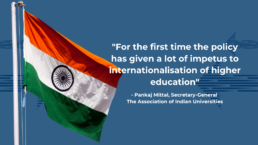How has internationalisation been impacted by the pandemic? And what are the changes driving global reputation in a sector dominated by globalisation and fierce competition, when international visibility has never been more crucial for success. These topics formed the background to a recent session at Times Higher Education’s Leadership and Management Summit.
The session was moderated by University of Glasgow’s Vice-Principal of External Relations and World 100 Member Rachel Sandison. She was joined by our own Founder and Director, Louise Simpson; Monique Mourits, Director of Marketing and Communications at Utrecht University; and Pankaj Mittal, Secretary-General at the Association of Indian Universities.
The importance of global reputation has never been more important to the internationalisation agenda, but the debate continues about the role of rankings.
Louise Simpson believes the two are interlinked: “Rankings have become increasingly a proxy, whether we like them or not, for reputation, and universities want to do well and rise in the rankings. One of the main metrics for THE and QS is the academic reputation survey – and how do you impress global academics? Impressive research and getting on their radar…so to do well in the rankings you de facto have to take international partnerships and international research seriously and have to make bigger efforts than universities had to do perhaps 20 to 30 years ago.”
The importance of internationalisation has grown over recent years, with international student recruitment becoming more competitive and beneficial to universities. This growing importance was highlighted by Pankaj Mittal who referenced the new education policy introduced in India in 2020. Previously, internationalisation had been of little importance in India but “for the first time the policy has given a lot of impetus to internationalisation of higher education,” Pankaj explained.

“For example, the policy says that one hundred top universities in the world can come and set up their campuses in India; that Indian universities can go and set up their campuses abroad. The policy talks about joint degrees, twinning programmes, transfer of credits from Indian universities to foreign universities and vice versa, and international offices in the Indian university. So, it recognises that internationalisation was not as important as it should have been.”
Pankaj Mittal also emphasised the changes wrought by the pandemic. “There was a huge effect, especially on the international students, …on collaborations between professors and international universities. If that is not there, the internationalisation won’t take place…and slowly people came to terms with the pandemic, and all this started happening online….so in many places the pandemic worked like an opportunity in the crisis”.
The opportunities provided by increased online engagement were also noted by Utrecht’s Monique Mourits. “I think we also know how amazing it was that we kept on teaching, and how research strengthened even in the last one and a half years. So, in a way, I think that a crisis might help strengthen reputation for universities sometimes.”
Similarly, Rachel Sandison, discussed the impact on the University of Glasgow. “We have been able to do some really interesting activity where we have taken a number of different partners from a number of different geographies and very different time zones and have brought them together in an online space to discuss thematic areas that of real importance to all of us. That would have been virtually impossible in pre-pandemic days because we really weren’t utilising technology in that way and we did feel that for us to engage meaningfully with our partners, we had to be physically sitting around a table with them, but actually we’ve been able to create more links between our partners and work more consistently with our partners”.

But the move to online hasn’t come without its challenges. Outside of the practical issues, it’s also drawn attention to the quality of teaching at universities, where previously teaching standards, good and bad, had been somewhat hidden from the view of external stakeholders. This has raised the questions of whether teaching quality should be a more important factor when judging reputation, something Louise Simpson agrees with.
“Universities should value teaching much more than they do. There’s far too much emphasis on research, and we know why that is – there’s a lot of money wrapped up in research. There is a teaching measure in the rankings, but when we’ve done insights into how academics vote in the rankings, they aren’t totally sure about the teaching, and they tend to give it the same measure as the research. So, it’s sort of shrouded in secrecy how well a university actually teaches and it’s frustrating”.
The value of teaching is also something that students want to see, according to two different pieces of research cited by the panel. Monique quoted a study from IINTO Global Partnership, “Gen Z shifting focus from rankings to outcomes when choosing a university”. Although the sample size was small, the survey found that 72% of students under 25 believe that the ability of a university to give them the skills they need to succeed in the future is more important than rankings.
Likewise, in research conducted by The World 100, students cited quality of teaching as the second most important factor (24%) when deciding what informs a university’s reputation, behind scholarships.

The debate around the increasing need to included teaching standards as a marker for reputation is part of a wider discussion on whether the sector is measuring reputation and assessing universities using the right metrics.
Teaching is just one metric that universities feel should be given more clout. The other is impact and sustainability. But what should the measures be? Progress in meeting the UN’s Sustainable Development Goals can be a way of assessing impact, and has resulted in the innovative THE Impact rankings.
Universities are increasingly prioritising impact in their strategies. “The societal mission of a university has never been more urgent than it is now,” says Monique Mourits. “There’s a large debate going on in Utrecht about the rankings and we decided not to hire people on their impact factor anymore. We don’t want to only recognise and reward individual effort and excellence, but we would like to reward team efforts and team sciences because we believe that’s the real way to reach our strategy.
“So, we are working on showing the impact…we don’t want to show what we are good in but what we are good for….and I would hope that rankings themselves would take on this debate and show us what we are good for”.
It is clear then that impact and sustainability have advanced as strategic imperatives and clear elements of international and reputation. But teaching – and how it is measured – is more complicated.
“Do we go by the pass level?” asks Pankaj Mittal. “Or the distinction rates the students get? Or the placements which the students get? Or do we depend on the student feedback? A lot of this depends on the type of students they are…. I think in the absence of this, research has been given a lot of focus [in the rankings] because it can be measured by so many things.”
We’ll have to keep our eyes peeled to see how the importance of reputation and internationalisation grow, and in particular, how rankings can develop more effective ways of measuring impact, not only of sustainability but teaching as well.


